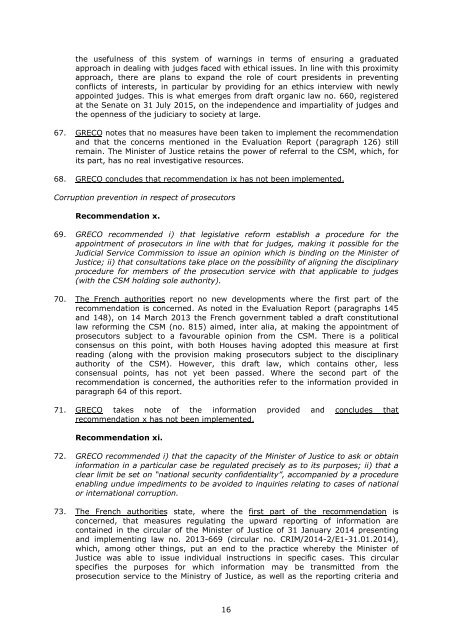F O U R T H E V A L U A T I O N R O U N D
1t62vEg
1t62vEg
You also want an ePaper? Increase the reach of your titles
YUMPU automatically turns print PDFs into web optimized ePapers that Google loves.
the usefulness of this system of warnings in terms of ensuring a graduated<br />
approach in dealing with judges faced with ethical issues. In line with this proximity<br />
approach, there are plans to expand the role of court presidents in preventing<br />
conflicts of interests, in particular by providing for an ethics interview with newly<br />
appointed judges. This is what emerges from draft organic law no. 660, registered<br />
at the Senate on 31 July 2015, on the independence and impartiality of judges and<br />
the openness of the judiciary to society at large.<br />
67. GRECO notes that no measures have been taken to implement the recommendation<br />
and that the concerns mentioned in the Evaluation Report (paragraph 126) still<br />
remain. The Minister of Justice retains the power of referral to the CSM, which, for<br />
its part, has no real investigative resources.<br />
68. GRECO concludes that recommendation ix has not been implemented.<br />
Corruption prevention in respect of prosecutors<br />
Recommendation x.<br />
69. GRECO recommended i) that legislative reform establish a procedure for the<br />
appointment of prosecutors in line with that for judges, making it possible for the<br />
Judicial Service Commission to issue an opinion which is binding on the Minister of<br />
Justice; ii) that consultations take place on the possibility of aligning the disciplinary<br />
procedure for members of the prosecution service with that applicable to judges<br />
(with the CSM holding sole authority).<br />
70. The French authorities report no new developments where the first part of the<br />
recommendation is concerned. As noted in the Evaluation Report (paragraphs 145<br />
and 148), on 14 March 2013 the French government tabled a draft constitutional<br />
law reforming the CSM (no. 815) aimed, inter alia, at making the appointment of<br />
prosecutors subject to a favourable opinion from the CSM. There is a political<br />
consensus on this point, with both Houses having adopted this measure at first<br />
reading (along with the provision making prosecutors subject to the disciplinary<br />
authority of the CSM). However, this draft law, which contains other, less<br />
consensual points, has not yet been passed. Where the second part of the<br />
recommendation is concerned, the authorities refer to the information provided in<br />
paragraph 64 of this report.<br />
71. GRECO takes note of the information provided and concludes that<br />
recommendation x has not been implemented.<br />
Recommendation xi.<br />
72. GRECO recommended i) that the capacity of the Minister of Justice to ask or obtain<br />
information in a particular case be regulated precisely as to its purposes; ii) that a<br />
clear limit be set on “national security confidentiality”, accompanied by a procedure<br />
enabling undue impediments to be avoided to inquiries relating to cases of national<br />
or international corruption.<br />
73. The French authorities state, where the first part of the recommendation is<br />
concerned, that measures regulating the upward reporting of information are<br />
contained in the circular of the Minister of Justice of 31 January 2014 presenting<br />
and implementing law no. 2013-669 (circular no. CRIM/2014-2/E1-31.01.2014),<br />
which, among other things, put an end to the practice whereby the Minister of<br />
Justice was able to issue individual instructions in specific cases. This circular<br />
specifies the purposes for which information may be transmitted from the<br />
prosecution service to the Ministry of Justice, as well as the reporting criteria and<br />
16


